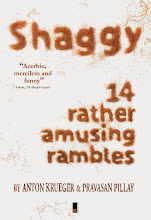
The short story has come back into its own over the past few years, possibly because time-strapped readers find them easier to manage than a lengthy novel.
This collection includes contributions from a remarkably diverse range of writers, including Gail Dendy, Jenna Mervis, Gillian Schutte and Jayne Bauling.
If there is one central theme to the book, it is alienation (or, to use real name, loneliness). The stories capture encounters and experiences which tilt us over into the cracks between the crevices of contemporary life: those dark, uncharted spaces where needs are failed by niceties, and pain and perdition walk hand in hand.
Pick of the crop – by a long way – is Bernard Levinson’s superb “Tokai”, which recounts his delivery of an Afrikaans couple, the Bezuidenhout’s, baby in the dead of night. But the birth is complicated and the womb goes into violent contractions, forcing him to manually secure it and staunch its gushing of blood.
For hours he sits, his hand in the uterus of his semi-comatose patient, feeling this incubator of life convulse, enfold his fingers and relay to him its arcana.
“There was a slight shift of tempo. I listened with the fingers of my fist. Unmistakably, I heard the womb flutter and shift itself minutely over my fist... It stretched and gripped. Stretched again and squeezed my fist firmly. I inched my hand out. A secret dialogue between my hand and the womb. My blunt fist - mute and solid. The womb excited, chattering and intimately pressing and caressing my hand.”
Witnessing the drama of this birth - like the primordial one and, indeed, all births - Kleinman Bezuidenhout is engulfed in agony as acute as his wife’s. The next morning, Levinson - preparing to leave - sees him engaged in a ritual which matches, in every detail, the intensity and power of the previous night’s crisis.
The story is an unforgettable glimpse into the soul of the healer, whose patients’ trust in him can crucify as often as it coronates, and whose brief role in their lives - as an outsider, observing and intervening, but never sharing - carries a unique loneliness.
Later, in Liesl Jobson’s “You Pay for the View: Twenty Tips for Super Pics”, we enter the alienation of a compulsive photographer unable to fully engage with her life, and attempting instead to capture its essence through her lens “because the camera never lies”.
Yet it does, for it lacks the vocabulary to capture the truth of locations and individuals, how they imbed themselves in the DNA of the soul and remain there forever, a testimony to life and loss. These are not within the province of pixel and resolution, but of another documenting medium altogether.
The third exceptional story in the collection, Pravasan Pillay’s “Mr Essop”, recounts the arrival of a seemingly kindly, placid lodger at his parents’ home. The author, still a child, notes the growing friendship between the boarder (Mr Essop) and his father - both lonely men - and their mutual pleasure at discovering the values they have in common. But when Essop suddenly shows a brutal side to his nature, shock is added to disappointment.
Aryan Kaganof’s “Same Difference” explores yet another kind of alienation: that of drug users, whose subculture and exclusion from mainstream society force them to band together, unwillingly recognising in each other kindred tortured spirits and putting on a show of bravado to conceal their desperation.
In this ugly, treacherous world, the only allegiances which matter, last as long as it takes to shoot up a crystal meth hit.
“The upstairs toilets are for blowjobs and the schnarf sessions. The outside toilets are for quick shags and schnarf sessions … Tretchikoff girls clustered on the walls and in the mirror. Looking down serenely on the useless lives of all the pastel customers. Useless, all of it. Useless.”
As the narrator ends yet another all-night session with his gang of users in the fetid, filthy basement of a nightclub, and the sun announces the break of yet another unwelcome day, he reflects: “I’m frightened. I’m lonely. Sometimes I feel close to death. But at least I scored tonight… There is no reason to stay alive. But I refuse to bribe the reaper to come and take me.”
Hans Pienaar’s contribution, Telephoning the Enemy”, makes a brave, but failed, effort to explore the alienation of white, apartheid-bound South Africans on the verge of political change. As bombs hidden in sidewalk garbage cans claim one civilian victim after another during the early 1980s, racist beliefs are heightened and the gap between terrorist and victim appears unbreachable.
Not all the stories have the gravitas or compositional skill to sustain the reader’s interest. Angelina N Sithebe’s cumbersome, melodramatic and poorly structured “Sepia”, for example, features characters who are utterly implausible, while Rosemund Handler’s “Clueless” exhumes a stale, clichéd story line: white, lonely madam coming on to a man across the colour bar, followed by a delicious explosion of eroticism and new awareness of each other as human beings. Hardly groundbreaking stuff.
Still, with 22 out of 24 stories offering piercing insights and showcasing a range of exciting writing talent, the collection is one of the best to emerge in recent years. Salafranca’s eloquent and moving foreword whet one’s appetite for the feast to come and the contributors’ profiles at the back of the book give perspective to the voices on the pages, which demand - and deserve - an audience.
(Published in
SA Jewish Report, July 8, 2011)






